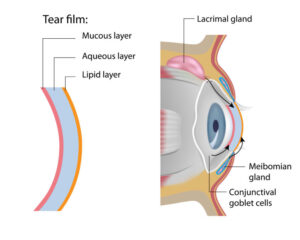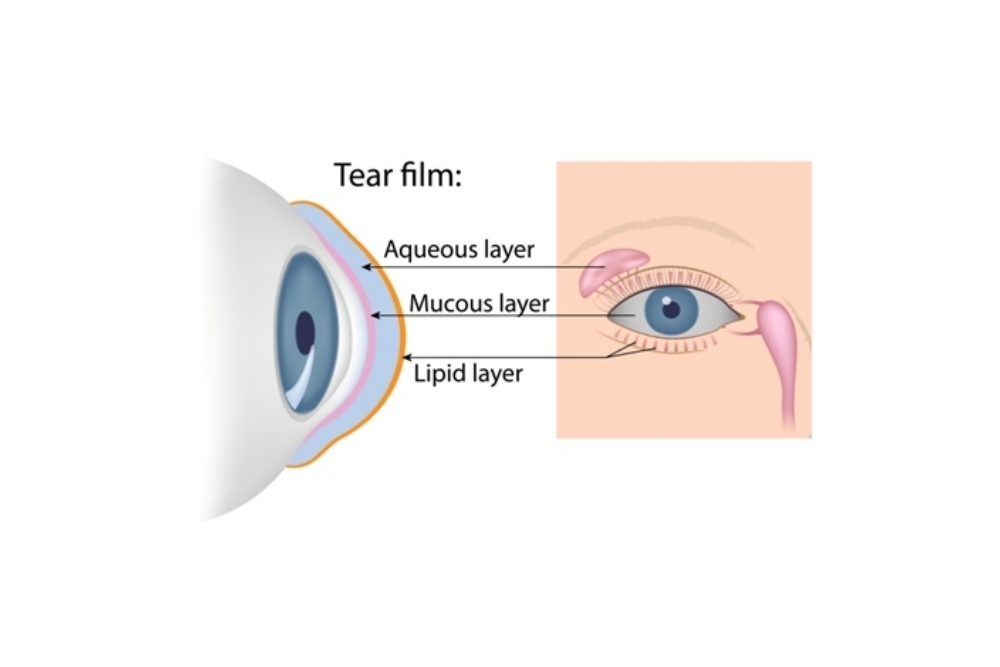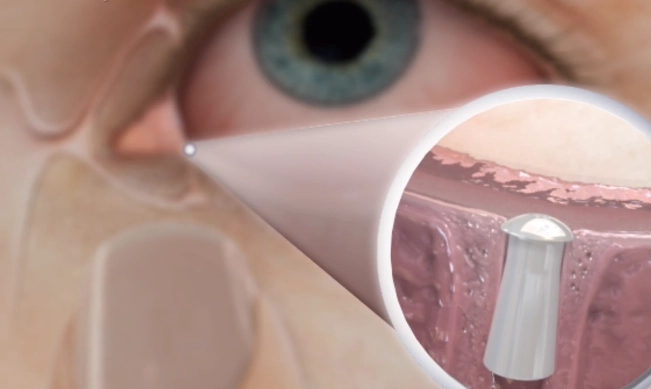Last Updated:
What is Dry Eye Syndrome?
Dry eye syndrome, sometimes referred to as dry eye disease, is a common eye condition caused by a lack of eye lubrication. Chronic dry eye is more than simply an annoyance: without proper treatment, dry eye syndrome can lead to lasting vision problems including ulcers, pain, or even vision loss.2
Symptoms of Dry Eye
 Dry eye syndrome symptoms may include:
Dry eye syndrome symptoms may include:
- Blurry vision
- Watery eyes
- Red eyes
- Eyes that burn or sting
- Itchy eyes
- The sensation that something is in your eyes
- Thick, stringy discharge from the eyes
- Light sensitivity
- Eye fatigue
- Difficulty wearing contact lenses
Causes of Dry Eye
- Dry eye syndrome can be caused by one or more of these risk factors:
- Environmental factors, such as pollutants, dust, smoke, or wind
- Dietary factors
- Wearing contact lenses for too long
- Medications, including birth control pills, antidepressants, diuretics, antihistamines, decongestants, and blood pressure medications
- Hormonal changes
- Menopause
- Lupus
- Diabetes
- Rheumatoid arthritis
- Thyroid disease
- Sjogren’s syndrome
- Autoimmune disorders
- Blepharitis
- Eye disorders such as entropion or ectropion

How Tears Work
Every time you blink, your tears moisturize your eyes and clear them of debris. There are three layers to the tear film: an oil (lipid) layer, an aqueous layer, and a mucin layer. In order to keep your eyes properly lubricated, a balance must be reached between the quality of your tears and the amount of tears produced.
Types of Dry Eye
Aqueous-Deficient Dry Eye
When a person has aqueous-deficient dry eye, the water (aqueous) part of their tears is poorly balanced. Many of our patients are able to achieve relief from aqueous-deficient dry eye using over-the-counter eye drops.
Evaporative Dry Eye
Evaporative dry eye is a result of a deficiency of the oil (lipid) layer of the tear film. Without sufficient lipids, the aqueous tear layer can’t hold enough moisture. This causes tears to evaporate more quickly than they should.
Meibomian Gland Dysfunction
The leading cause of dry eye syndrome is meibomian gland dysfunction. The lipid layer of the tear film is produced by the meibomian glands. Evaporative dry eye is often caused by a blockage of the meibomian glands. Blepharitis is also a side effect of meibomian gland dysfunction. This occurs when bacteria accumulates on or under the upper or lower eyelids, and can also cause dry eye symptoms.
Home Remedies for Dry Eye
Over-the-counter or home remedies for dry eye may help temporarily alleviate symptoms. Things you can try at home to improve dry eye include:
Changing your environment: Try turning fans away from your face, using a humidifier, reducing the amount of time you wear contact lenses, and taking frequent breaks from looking at computer or smartphone screens.
Artificial tears: Over-the-counter eye drops can provide temporary relief from dry eye syndrome. It is important to select eye drops without preservatives that are designed to lubricate your eyes, not just reduce redness.
A warm compress: Holding a heat mask over your eyes for 15 minutes is often helpful.
Vitamins and supplements: Tear production may be benefitted by eye health supplements and Omega-3 fatty acids.

Professional Treatment for Dry Eye
When over-the-counter products and home remedies aren’t providing adequate relief from dry eye symptoms, it is time to seek professional help from your ophthalmologist. At Tidewater Eye Centers, we provide a full range of dry eye treatments, including:
TearCare®
With a single comfortable TearCare session, our eye doctors can clear blockages in the meibomian glands, which is a common cause of dry eye. Patients simply relax in our office wearing a TearCare device over their eyes. The device applies constant therapeutic heat to the meibomian glands over the course of 15 minutes. Following the application of moist heat, a gentle massage is performed to clear blockages and remove debris. According to clinical research, just 12 minutes of TearCare treatment provides more relief than weeks or months of using a warm compress.3
OCuSOFT® Thermal 1-Touch™
This in-office dry eye treatment provides our patients with fast relief. A small device is used to deliver steady, targeted heat, breaking up blockages in the meibomian glands so that the eye’s natural lubrication can properly function.
BlephEx® for Blepharitis
Blepharitis is a condition that frequently accompanies dry eye syndrome, and is caused by excessive bacterial growth on or under the eyelids. Blepharitis is often caused by meibomian gland dysfunction. BlephEx is a micro-sponge that our eye doctors gently pass over the inner and outer surfaces of the eyelids, removing bacteria and biofilm and exfoliating the area to prevent future buildup. After sweeping BlephEx medical grade sponges over the area, the doctor rinses away debris.4
Prescription Eye Drops
For patients who suffer from aqueous-deficient dry eye syndrome, we offer Restasis® and Xiidra®. These prescription eye drops provide our patients with long-lasting symptom relief, unlike eye drops that are available over-the-counter.

Punctal Plugs
Punctal plugs are also known as tear duct plugs or lacrimal plugs. Your eye doctor will insert these tiny devices into your tear ducts to prevent drainage and help keep your eyes lubricated.
Frequently Asked Questions About Dry Eye
Does dry eye go away?
If you suffer from chronic dry eye, it won’t go away on its own. When over-the-counter remedies don’t provide you with dry eye symptom relief, it is important to seek professional treatment in order to prevent more serious eye problems like recurring eye infections, ulcers, and damage to the cornea.5
How can I have dry eye if my eyes are constantly watering?
It may seem like dry eye syndrome and watery eyes are contradictory. However, the eyes sometimes produce extra tears to combat dryness and a lack of lubrication, which may be caused by poor tear production, poor tear quality, and rapid tear evaporation.
Contact Us
If you suffer from the uncomfortable symptoms of dry eye syndrome, our eye doctors can help you find lasting relief. Contact us to schedule a dry eye consultation: our eye care experts are proud to serve patients from Chesapeake, Virginia Beach and Portsmouth, VA and nearby communities.
